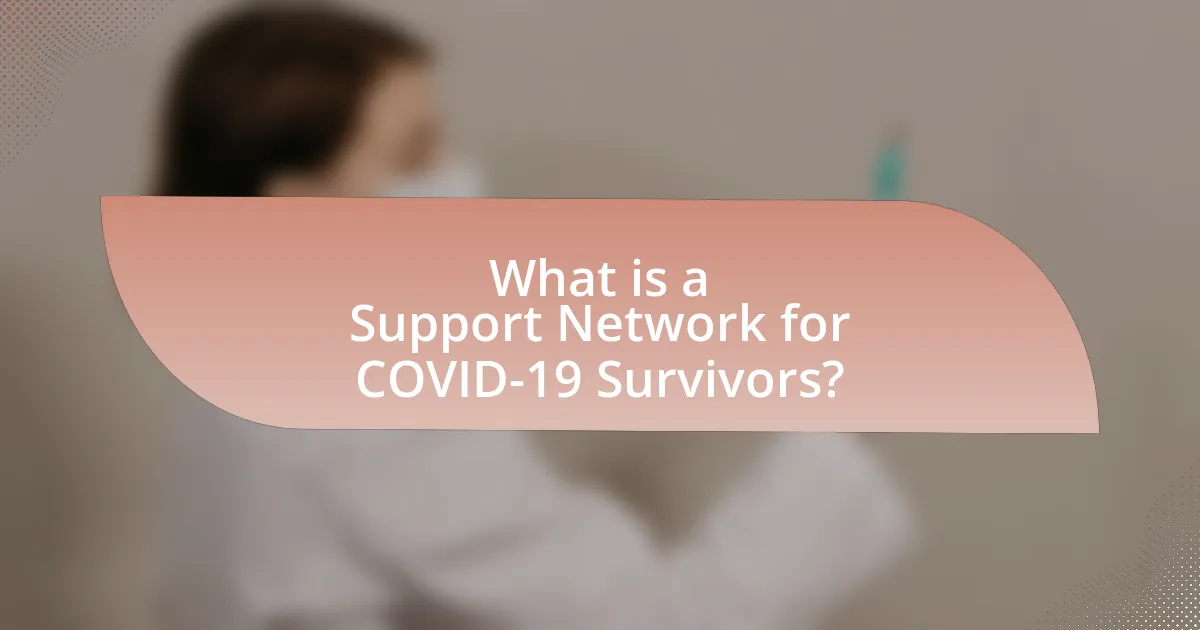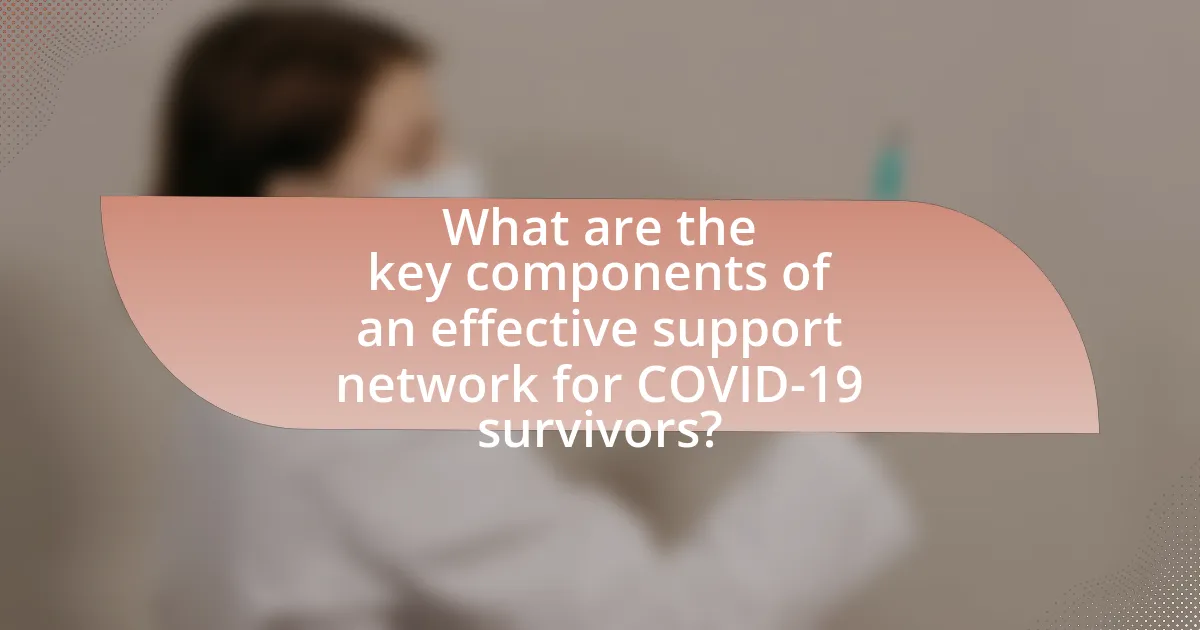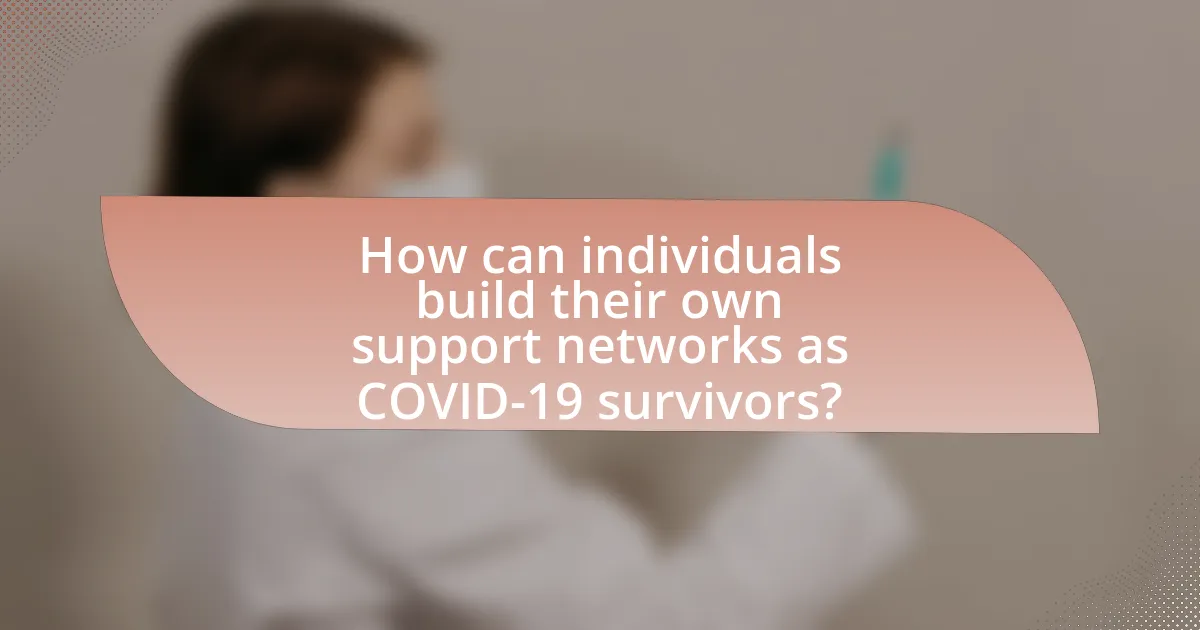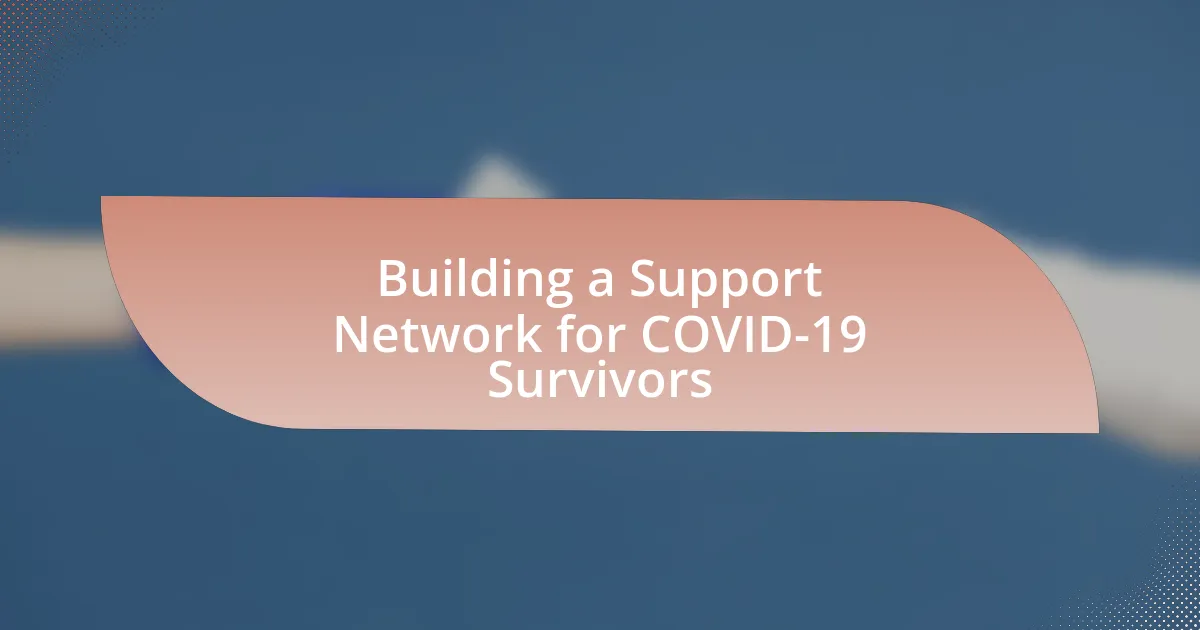A support network for COVID-19 survivors is a structured group that offers emotional, psychological, and practical assistance to individuals recovering from the virus. This article outlines the benefits of such networks, including improved mental health outcomes, access to healthcare resources, and reduced feelings of isolation. It discusses the key components of effective support networks, the role of community organizations and healthcare professionals, and the importance of peer support groups. Additionally, it highlights the challenges faced by survivors and provides strategies for building and maintaining these networks, emphasizing the significance of social connections in the recovery process.

What is a Support Network for COVID-19 Survivors?
A support network for COVID-19 survivors is a structured group of individuals and organizations that provide emotional, psychological, and practical assistance to those who have recovered from the virus. This network typically includes healthcare professionals, mental health counselors, peer support groups, and community resources aimed at addressing the unique challenges faced by survivors, such as lingering health issues and social isolation. Research indicates that social support can significantly improve mental health outcomes for individuals recovering from traumatic experiences, including illness, highlighting the importance of such networks in promoting overall well-being among COVID-19 survivors.
How does a support network benefit COVID-19 survivors?
A support network benefits COVID-19 survivors by providing emotional, psychological, and practical assistance during recovery. This network helps individuals cope with the mental health challenges associated with the virus, such as anxiety and depression, which have been reported in studies indicating that up to 30% of COVID-19 survivors experience these issues. Additionally, support networks can facilitate access to resources like healthcare, financial aid, and community services, which are crucial for those facing long-term effects of the virus. Research published in the Journal of Psychosomatic Research highlights that social support significantly improves recovery outcomes and overall well-being for individuals recovering from serious illnesses, including COVID-19.
What emotional support can a network provide to survivors?
A network can provide emotional support to survivors by offering a sense of belonging, understanding, and shared experiences. This support can manifest through peer connections, where survivors share their feelings and coping strategies, reducing feelings of isolation. Research indicates that social support significantly enhances emotional well-being, as evidenced by a study published in the Journal of Health Psychology, which found that individuals with strong social networks report lower levels of anxiety and depression. Additionally, networks can facilitate access to mental health resources, such as counseling and support groups, further aiding survivors in their emotional recovery.
How does social interaction impact recovery for survivors?
Social interaction significantly enhances recovery for survivors by providing emotional support, reducing feelings of isolation, and fostering a sense of belonging. Research indicates that social connections can lead to improved mental health outcomes, which are crucial for recovery. For instance, a study published in the Journal of Health and Social Behavior found that individuals with strong social ties experienced lower levels of depression and anxiety, which are common among survivors. Furthermore, social interactions can facilitate access to resources and information, aiding in the recovery process. Thus, the presence of a supportive network is vital for the overall well-being and recovery of survivors.
Why is building a support network essential for COVID-19 survivors?
Building a support network is essential for COVID-19 survivors because it provides emotional, psychological, and practical assistance during recovery. Survivors often experience lingering symptoms, mental health challenges, and social isolation, which can be alleviated through connections with others who understand their experiences. Research indicates that social support significantly improves mental health outcomes, with studies showing that individuals with strong support networks report lower levels of anxiety and depression. Furthermore, a study published in the Journal of Medical Internet Research found that peer support can enhance coping strategies and promote resilience among individuals recovering from COVID-19. Thus, establishing a support network is crucial for facilitating holistic recovery and improving overall well-being for COVID-19 survivors.
What challenges do COVID-19 survivors face that a support network can address?
COVID-19 survivors face several challenges that a support network can effectively address, including mental health issues, physical rehabilitation needs, and social isolation. Mental health challenges such as anxiety, depression, and PTSD are prevalent among survivors, with studies indicating that up to 30% of individuals experience these conditions post-infection. A support network can provide emotional support, counseling, and resources to help manage these mental health issues.
Additionally, many survivors experience long-term physical effects, often referred to as “long COVID,” which can include fatigue, respiratory problems, and cognitive difficulties. A support network can facilitate access to medical care, rehabilitation services, and peer support groups that focus on recovery and coping strategies.
Social isolation is another significant challenge, as survivors may feel disconnected from their communities due to stigma or lingering health concerns. A support network can foster connections through community events, online forums, and social activities, helping survivors rebuild their social lives and reduce feelings of loneliness.
In summary, a support network can address the mental health, physical rehabilitation, and social isolation challenges faced by COVID-19 survivors, providing essential resources and community connections.
How can a support network facilitate access to resources and information?
A support network can facilitate access to resources and information by connecting individuals with relevant services, expertise, and community support. These networks often include healthcare professionals, social workers, and peer support groups that provide guidance on navigating post-COVID-19 recovery, mental health resources, and financial assistance programs. For instance, studies show that individuals who engage with support networks report higher satisfaction in accessing healthcare services and information, as these networks can streamline communication and provide tailored resources based on specific needs.

What are the key components of an effective support network for COVID-19 survivors?
An effective support network for COVID-19 survivors includes emotional support, practical assistance, access to healthcare resources, and community engagement. Emotional support is crucial as it helps survivors cope with feelings of isolation and anxiety, which are common post-infection. Practical assistance, such as help with daily tasks or transportation, alleviates the burden of recovery. Access to healthcare resources ensures that survivors receive necessary medical follow-ups and mental health services, which are vital for long-term recovery. Community engagement fosters a sense of belonging and reduces stigma, promoting overall well-being. These components collectively enhance the recovery experience for COVID-19 survivors, as evidenced by studies indicating that social support significantly improves mental health outcomes in post-viral conditions.
How can community organizations contribute to support networks?
Community organizations can contribute to support networks by providing resources, facilitating connections, and offering programs tailored to the needs of COVID-19 survivors. These organizations often serve as hubs for information dissemination, connecting individuals to mental health services, financial assistance, and peer support groups. For instance, a study by the National Alliance on Mental Illness highlights that community organizations play a crucial role in reducing isolation and fostering resilience among individuals facing health crises. By organizing workshops, support groups, and outreach initiatives, these organizations enhance the social fabric necessary for effective support networks.
What role do healthcare professionals play in these networks?
Healthcare professionals play a crucial role in support networks for COVID-19 survivors by providing medical guidance, emotional support, and resources for recovery. They assess the physical and mental health needs of survivors, facilitating access to rehabilitation services and mental health counseling. Evidence from studies indicates that healthcare professionals significantly improve patient outcomes through personalized care plans and ongoing follow-up, which are essential for addressing the long-term effects of COVID-19. Their expertise helps survivors navigate the complexities of post-viral syndromes, ensuring they receive comprehensive care tailored to their unique situations.
How can peer support groups enhance the network’s effectiveness?
Peer support groups can enhance the network’s effectiveness by fostering a sense of community and shared understanding among COVID-19 survivors. These groups provide emotional support, practical advice, and a platform for sharing experiences, which can lead to improved mental health outcomes. Research indicates that individuals who participate in peer support report higher levels of satisfaction and lower levels of anxiety and depression. For instance, a study published in the Journal of Medical Internet Research found that peer support significantly improved psychological well-being among participants, demonstrating the tangible benefits of such networks.
What types of support can be included in a network for COVID-19 survivors?
A network for COVID-19 survivors can include emotional support, medical assistance, financial aid, and social connections. Emotional support can be provided through peer support groups and counseling services, which help survivors cope with mental health challenges. Medical assistance may involve access to healthcare professionals for ongoing treatment and rehabilitation, addressing both physical and psychological effects of the virus. Financial aid can be offered through community resources or government programs to assist with medical bills and lost income. Lastly, social connections foster a sense of belonging and reduce feelings of isolation, which are crucial for recovery. These types of support are essential for the holistic well-being of COVID-19 survivors.
What mental health resources are available for survivors?
Mental health resources available for survivors of COVID-19 include counseling services, support groups, and hotlines specifically designed to address trauma and mental health challenges. Organizations such as the National Alliance on Mental Illness (NAMI) provide resources and support for individuals experiencing mental health issues post-COVID-19. Additionally, the Substance Abuse and Mental Health Services Administration (SAMHSA) offers a national helpline that connects individuals to local treatment facilities and support services. Research indicates that survivors may experience increased anxiety and depression, making access to these resources crucial for recovery and well-being.
How can practical assistance be organized within the network?
Practical assistance within the network can be organized by establishing clear communication channels and designated roles for volunteers and support staff. This structure allows for efficient coordination of resources, such as food delivery, medical supplies, and emotional support services. For instance, utilizing platforms like WhatsApp or dedicated apps can facilitate real-time updates and requests for assistance, ensuring that needs are met promptly. Research indicates that organized networks improve response times and resource allocation, as seen in community support initiatives during the COVID-19 pandemic, where structured volunteer systems significantly enhanced service delivery to affected individuals.

How can individuals build their own support networks as COVID-19 survivors?
Individuals can build their own support networks as COVID-19 survivors by actively engaging with community resources, online platforms, and peer support groups. Engaging with local organizations that focus on health and wellness can provide access to resources and connections with others who have had similar experiences. Online platforms, such as social media groups and forums specifically for COVID-19 survivors, facilitate sharing experiences and advice, fostering a sense of community. Additionally, participating in peer support groups, either virtually or in-person, allows survivors to connect with others who understand their challenges, enhancing emotional support and resilience. Research indicates that social support significantly contributes to recovery and mental well-being, underscoring the importance of these networks for COVID-19 survivors.
What steps should survivors take to initiate a support network?
Survivors should first identify and reach out to individuals who share similar experiences or challenges related to COVID-19. This can include friends, family, or community members who have also faced the impacts of the virus. Next, they should establish a communication platform, such as a group chat or social media group, to facilitate ongoing discussions and support. Organizing regular meetings, whether virtual or in-person, can help maintain engagement and strengthen connections among members. Additionally, survivors can seek guidance from local organizations or mental health professionals to provide resources and structure to the network. Research indicates that social support significantly enhances recovery and well-being, highlighting the importance of these steps in fostering a supportive environment for survivors.
How can survivors identify and reach out to potential network members?
Survivors can identify and reach out to potential network members by utilizing online platforms, community resources, and support groups specifically designed for COVID-19 survivors. Engaging in social media groups, forums, and local community organizations allows survivors to connect with others who share similar experiences. Research indicates that peer support significantly enhances recovery and emotional well-being, as evidenced by studies showing that individuals who participate in support networks report higher levels of resilience and lower levels of anxiety. By actively participating in these platforms, survivors can establish meaningful connections and foster a supportive environment.
What strategies can be used to maintain engagement within the network?
To maintain engagement within the network for COVID-19 survivors, implementing regular virtual meetups and interactive activities is essential. These strategies foster a sense of community and belonging, which is crucial for emotional support. For instance, studies show that regular online gatherings can increase participant interaction by up to 50%, enhancing the overall network experience. Additionally, utilizing social media platforms for updates and sharing personal stories can keep members connected and invested in each other’s journeys. Engaging content, such as webinars with health professionals or peer-led discussions, can also sustain interest and participation, reinforcing the network’s purpose and value.
What tools and platforms can facilitate the creation of support networks?
Tools and platforms that can facilitate the creation of support networks include social media platforms, online forums, and dedicated support apps. Social media platforms like Facebook and Twitter allow users to connect with others who share similar experiences, fostering community and support. Online forums such as Reddit and specialized websites provide spaces for discussion and sharing resources among COVID-19 survivors. Additionally, dedicated support apps like MyStrength and TalkLife offer structured environments for emotional support and mental health resources, enabling users to engage with peers and professionals. These tools have been shown to enhance social connections and provide vital resources for individuals navigating the challenges of recovery.
How can social media be utilized to connect survivors?
Social media can be utilized to connect survivors by creating dedicated online support groups and forums where individuals can share their experiences and offer mutual support. These platforms enable survivors to communicate in real-time, fostering a sense of community and belonging. Research indicates that online support networks can significantly reduce feelings of isolation among individuals facing similar challenges, as evidenced by a study published in the Journal of Medical Internet Research, which found that 70% of participants reported improved emotional well-being after engaging in online support groups.
What online resources are available for organizing support groups?
Online resources available for organizing support groups include platforms like Meetup, Facebook Groups, and Zoom. Meetup allows users to create events and connect with individuals who share similar interests, making it suitable for support group organization. Facebook Groups provides a space for members to communicate, share experiences, and schedule meetings, fostering community engagement. Zoom facilitates virtual meetings, enabling participants to connect regardless of location, which is particularly beneficial for COVID-19 survivors who may prefer remote interactions. These platforms have been widely used during the pandemic to maintain social connections and provide support.
What best practices should be followed when building a support network for COVID-19 survivors?
To build an effective support network for COVID-19 survivors, it is essential to prioritize inclusivity, accessibility, and mental health resources. Inclusivity ensures that all survivors, regardless of their background or experience, feel welcomed and valued within the network. Accessibility involves providing various communication channels, such as online forums, phone support, and in-person meetings, to accommodate different needs and preferences. Mental health resources, including counseling and peer support groups, are crucial for addressing the psychological impact of COVID-19, as studies indicate that survivors often experience anxiety, depression, and PTSD. For instance, a study published in the Journal of Affective Disorders found that 34% of COVID-19 survivors reported significant psychological distress. By focusing on these best practices, support networks can effectively assist survivors in their recovery journey.
How can confidentiality and trust be established within the network?
Confidentiality and trust within the network can be established by implementing robust data protection measures and fostering open communication. Organizations should utilize encryption protocols to secure sensitive information shared among network members, ensuring that personal data remains confidential. Additionally, creating a culture of transparency, where members feel safe to share their experiences without fear of judgment or breach of privacy, enhances trust. Research indicates that networks with clear privacy policies and regular training on confidentiality practices report higher levels of trust among participants, as seen in studies conducted by the Journal of Health Communication.
What methods can be used to evaluate the effectiveness of the support network?
To evaluate the effectiveness of the support network for COVID-19 survivors, methods such as surveys, interviews, and outcome measurements can be employed. Surveys can quantify participant satisfaction and perceived benefits, while interviews provide qualitative insights into individual experiences. Additionally, outcome measurements, such as tracking improvements in mental health or social engagement, can offer concrete data on the network’s impact. Research indicates that structured feedback mechanisms, like the use of validated scales for mental health assessment, enhance the reliability of these evaluations, ensuring that the support network meets the needs of its members effectively.


